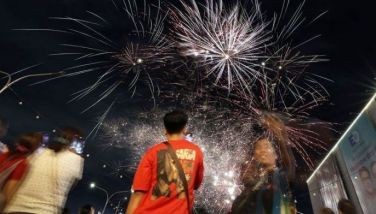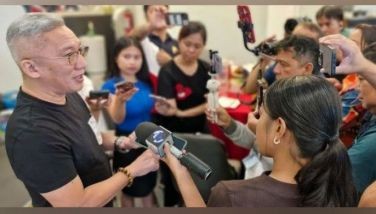As HRRAC admits increase in room rates: Summit organizers to look into hotel rate 'overpricing'
November 14, 2006 | 12:00am
While organizers of the 12th Association of Southeast Asian Nations (ASEAN) Summit promised to look into reports of very expensive hotel rates in Cebu, those from the industry explained that this is a normal occurrence.
Ambassador Marciano Paynor Jr., chairman of the 12th ASEAN Summit national organizing committee (NOC), yesterday said if found that the hotel rates are really "unreasonable" they will look into the matter. A sentiment shared by Cebu Gov. Gwendolyn Garcia.
Marco Protacio, the general manager of Waterfront Cebu City Hotel and Casino, who sits as president of the Hotels Resorts and Restaurants Association of Cebu (HRRAC), admitted that the room rates have really gone up because of the summit.
He explained that the high rates of hotel rooms are part of the normal business cycle in response to the demand. He however assured that these prices are still within the Department of Tourism approved published rates.
Cebu City Mayor Tomas Osmeña said that this increase in the hotel rates is due to the law of supply and demand and apologized for such. He said that such also happens every January when people flock to Cebu for the Sinulog celebration.
Paynor said, "if it's really unreasonable then I will instruct all of our sub-committees, especially for ourselves, to look into this."
This issue was raised to Paynor in response to complaints about Cebu hotel rates being jacked up in time for the summit.
Paynor told reporters yesterday the issue on overcharging of hotel rates was already taken up by the committee in a meeting with the Foreign Correspondents Association of the Philippines (Focap).
He explained that the case that was made as an example in a November 20 issue of the Newsbreak Magazine that tackled the supposed "money-making" venture of the ASEAN summit organizers was an isolated case.
Nevertheless, Paynor emphasized that based on his personal experience the hotel rates of host country or city really go up during the summit.
In fact, all hotels that will accommodate foreign media during the summit have asked the organizing committee about the rates, but Paynor said ours is a free economy.
And in view of the fact that many if not all of these hotels are implementing improvements of their facilities and amenities for the summit, then they are only "entitled to raise their room rates."
But although the International Press Center (IPC) under the Office of the Press Secretary acts as go-between for the hotels, the foreign media outfits are nevertheless asked to directly coordinate with the respective hotels.
Gov. Garcia, who discussed the issues with Paynor during their visit to the CICC yesterday afternoon, said now is not the time to raise the rates.
Protacio explained the nature of the hotel business saying that there are different rates for the lean and peak seasons while denying the allegations that they are taking advantage of the summit.
He said that hotels charge the minimum during leans months to encourage business, but are forced to charge the maximum during peak season due to the high demand for rooms.
The Foreign Correspondents Association of the Philippines reportedly complained because of the overpricing of the hotel room rates in Cebu. The International Press Center, which has arranged for the international media accommodation has been suspected of jacking up the room rates.
FOCAP reportedly complained that the room rates of the hotels in Cebu ranged from $200 to $250 per night, which they said is very much higher than its published rates of $85 a day.
Protacio admitted during an interview over radio station DYLA that the $200 to $250 per night rates could be expensive if it is only for a standard hotel room. But, for a deluxe room in a five-star hotel the price is reasonable enough.
However, the Newsbreak magazine reported in its November issue that the hotel rates during the last ASEAN summit held in Kuala Lumpur Malaysia was only $75 a day.
City Hall information officer Nagiel Bañacia, who is among the people in-charge in the foreign media accommodation, assured that nobody is making money out of the foreign media. Bañacia said that they just reserved hotel rooms on behalf of the foreign press.
Philippine Chamber of Commerce and Industry Governor Robert Go appealed to the different hotel management not to take advantage of the ASEAN summit.
According to Go, it will leave a "bad taste" about Cebu if the impression of the visitors is that this place is very expensive.
Go said the ASEAN summit should be treated as an investment rather than a business opportunity.
Osmeña yesterday warned he will order the cancellation of the franchises of taxis that do not flag down their fare meter when taking passengers.
The mayor said, he has received reports that several taxi drivers have engaged into a modus operandi wherein a fixed rate is imposed on unsuspecting passengers, especially foreigners. And with more foreign tourists expected to arrive especially for the ASEAN Summit, the mayor believes this should not be tolerated.
He said this modus operandi is an insult to the city's move to orient taxi drivers on the proper way to deal with passengers.
Since the national government reportedly has not shelled out money to support the project, the city will allocate a budget for an orientation/seminar.
To prevent this practice from propagating, the city plans to distribute warning cards to visitors that would remind them to ask for a metered travel. If a taxi driver refuses to flag down the fare meter, the passenger can take note of the taxi's and the driver's name and the vehicle's plate number for the filing of a formal complaint. - Cristina C. Birondo, Fred P. Languido and Joeberth M. Ocao/NLQ
Ambassador Marciano Paynor Jr., chairman of the 12th ASEAN Summit national organizing committee (NOC), yesterday said if found that the hotel rates are really "unreasonable" they will look into the matter. A sentiment shared by Cebu Gov. Gwendolyn Garcia.
Marco Protacio, the general manager of Waterfront Cebu City Hotel and Casino, who sits as president of the Hotels Resorts and Restaurants Association of Cebu (HRRAC), admitted that the room rates have really gone up because of the summit.
He explained that the high rates of hotel rooms are part of the normal business cycle in response to the demand. He however assured that these prices are still within the Department of Tourism approved published rates.
Cebu City Mayor Tomas Osmeña said that this increase in the hotel rates is due to the law of supply and demand and apologized for such. He said that such also happens every January when people flock to Cebu for the Sinulog celebration.
Paynor said, "if it's really unreasonable then I will instruct all of our sub-committees, especially for ourselves, to look into this."
This issue was raised to Paynor in response to complaints about Cebu hotel rates being jacked up in time for the summit.
Paynor told reporters yesterday the issue on overcharging of hotel rates was already taken up by the committee in a meeting with the Foreign Correspondents Association of the Philippines (Focap).
He explained that the case that was made as an example in a November 20 issue of the Newsbreak Magazine that tackled the supposed "money-making" venture of the ASEAN summit organizers was an isolated case.
Nevertheless, Paynor emphasized that based on his personal experience the hotel rates of host country or city really go up during the summit.
In fact, all hotels that will accommodate foreign media during the summit have asked the organizing committee about the rates, but Paynor said ours is a free economy.
And in view of the fact that many if not all of these hotels are implementing improvements of their facilities and amenities for the summit, then they are only "entitled to raise their room rates."
But although the International Press Center (IPC) under the Office of the Press Secretary acts as go-between for the hotels, the foreign media outfits are nevertheless asked to directly coordinate with the respective hotels.
Gov. Garcia, who discussed the issues with Paynor during their visit to the CICC yesterday afternoon, said now is not the time to raise the rates.
Protacio explained the nature of the hotel business saying that there are different rates for the lean and peak seasons while denying the allegations that they are taking advantage of the summit.
He said that hotels charge the minimum during leans months to encourage business, but are forced to charge the maximum during peak season due to the high demand for rooms.
The Foreign Correspondents Association of the Philippines reportedly complained because of the overpricing of the hotel room rates in Cebu. The International Press Center, which has arranged for the international media accommodation has been suspected of jacking up the room rates.
FOCAP reportedly complained that the room rates of the hotels in Cebu ranged from $200 to $250 per night, which they said is very much higher than its published rates of $85 a day.
Protacio admitted during an interview over radio station DYLA that the $200 to $250 per night rates could be expensive if it is only for a standard hotel room. But, for a deluxe room in a five-star hotel the price is reasonable enough.
However, the Newsbreak magazine reported in its November issue that the hotel rates during the last ASEAN summit held in Kuala Lumpur Malaysia was only $75 a day.
City Hall information officer Nagiel Bañacia, who is among the people in-charge in the foreign media accommodation, assured that nobody is making money out of the foreign media. Bañacia said that they just reserved hotel rooms on behalf of the foreign press.
Philippine Chamber of Commerce and Industry Governor Robert Go appealed to the different hotel management not to take advantage of the ASEAN summit.
According to Go, it will leave a "bad taste" about Cebu if the impression of the visitors is that this place is very expensive.
Go said the ASEAN summit should be treated as an investment rather than a business opportunity.
The mayor said, he has received reports that several taxi drivers have engaged into a modus operandi wherein a fixed rate is imposed on unsuspecting passengers, especially foreigners. And with more foreign tourists expected to arrive especially for the ASEAN Summit, the mayor believes this should not be tolerated.
He said this modus operandi is an insult to the city's move to orient taxi drivers on the proper way to deal with passengers.
Since the national government reportedly has not shelled out money to support the project, the city will allocate a budget for an orientation/seminar.
To prevent this practice from propagating, the city plans to distribute warning cards to visitors that would remind them to ask for a metered travel. If a taxi driver refuses to flag down the fare meter, the passenger can take note of the taxi's and the driver's name and the vehicle's plate number for the filing of a formal complaint. - Cristina C. Birondo, Fred P. Languido and Joeberth M. Ocao/NLQ
BrandSpace Articles
<
>
- Latest
- Trending
Trending
Latest





















